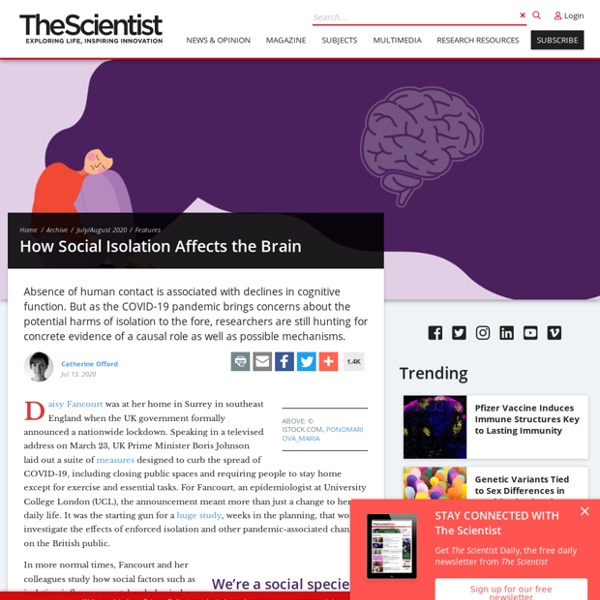Older adults who are socially isolated tend to perform worse on tests of thinking abilities
Physical pain is unpleasant, yet it’s vital for survival because it’s a warning that your body is in danger. It tells you to take your hand off a hot burner or to see a doctor about discomfort in your chest. Pain reminds us all that we need to take care of ourselves. Feeling lonely is the social equivalent to feeling physical pain.
Health effects of social isolation and loneliness
Clifford Singer, MD Adjunct Professor, University of Maine Chief, Geriatric Mental Health and Neuropsychiatry Acadia Hospital and Eastern Maine Medical Center 268 Stillwater Avenue Bangor Maine 04402 207.973.6179 csinger@emhs.org Cliff Singer is a geriatrician and psychiatrist. He lives in Orono, Maine and directs the Mood and Memory Clinic at Acadia Hospital and Alzheimer’s Disease Research Program for Acadia Hospital and Eastern Maine Medical Center in Bangor. He trained in general psychiatry and geriatric medicine at Oregon Health and Science University and served on the faculties of psychiatry and neurology there and at the University of Vermont before moving to Maine in 2010.
Boundless Psychology
Physical Development in Late Adulthood The aging process often results in a loss of memory, deteriorated intellectual function, decreased mobility, and higher rates of disease. Learning Objectives Review the physical and neurological changes characteristic of late adulthood
Social isolation results in memory loss in later life
Social isolation contributes to memory loss in older age, research by LSE's Care and Evaluation Centre has shown for the first time. The paper, published in Journals of Gerontology, found that both men and women were affected, but in different ways. Men with high levels of social isolation experienced subsequent memory decline. For women it was not the overall level of lack of social contact, but rather increases in isolation that were important. Researchers studied data from 6123 women and 5110 men over the age of 50, from the English Longitudinal Study of Ageing (ELSA), over six two year intervals from 2002. By using a statistical model to analyze the changes in levels of social isolation and memory loss over time, they were able to establish that isolation precedes memory loss—rather than the other way around.
10 Ways to Help Seniors Deal with Isolation and Depression – DailyCaring
Many seniors go through major life changes that could make them more vulnerable to depression. But it’s heartbreaking to stand by and watch someone deal with depression or loneliness on their own. Zara Lewis shares 10 ways you can help your older adult cope with symptoms and improve their quality of life. According to WHO estimates, depression affects about 350 million people of all ages worldwide.
Caregiver Stress and Burnout
What is caregiver burnout? While caring for a loved one can be very rewarding, it also involves many stressors. And since caregiving is often a long-term challenge, the emotional impact can snowball over time. You may face years or even decades of caregiving responsibilities.
Ways to overcome or avoid social isolation for caregivers
There's a difference between isolation and loneliness. Social isolation is the physical separation from other people--a literal lack of social connections or interactions. Meanwhile, loneliness is an emotional response to social isolation--the discrepancy between a person's desired and actual social relationships. In other words, loneliness is the subjective distressed feeling of being alone or separated, while isolation is objective.
Psychosocial Development in Late Adulthood
What you’ll learn to do: describe psychosocial development in in late adulthood Our ideas about aging, and what it means to be over 50, over 60, or even over 90, seem to be stuck somewhere back in the middle of the 20th century. We still consider 65 as standard retirement age, and we expect everyone to start slowing down and moving aside for the next generation as their age passes the half-century mark. In this section we explore psychosocial developmental theories, including Erik Erikson’s theory on psychosocial development in late adulthood, and we look at aging as it relates to work, retirement, and leisure activities for older adult. We’ll also examine ways in which people are productive in late adulthood. Learning outcomes



